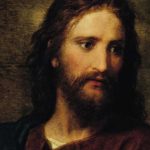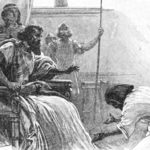The doctrine of the deity (divinity) of Jesus Christ is a central and necessary belief of Christianity since it qualifies the true nature of Jesus as both man and God. As a result, it can also be used as a measuring stick against false religions and religious systems that pervert the Word of God and the true nature of Christ. Each believer should have an understanding of and a conviction for this doctrine. Following are fifteen important proofs about the Biblical claims that Jesus Christ is fully God.
-
- In John 1:1, “in the beginning was the Word, and the Word was with God, and the Word was God.” In verse 14, we see that this “Word” became flesh and dwelt among us, a direct reference to Jesus Christ. Some non-Christian groups have attacked this translation of the italicized portion of this verse from the Greek, “kai theos een ho logos”, as referring to “a god” rather than “God” because of a lack of a definite article with “theos” (God). This claim is not accurate because:
- The grammatical construction of the sentence does not require there to be a definite article in order for the word to be a definite predicate nominative. This is consistent with other verses in John 1 (vss. 6, 12, 13, and 18) where “theos” is translated as “God” even though it has no definite article.
- The exact sentence structure of this verse is found in John 19:21 and translated, “I am King of the Jews”, not “a king”.
- Isaiah 9:6 is clearly a reference to Jesus Christ (“For a child will be born to us, a son will be given to us”). In this verse, Jesus is referred to as “Mighty God” (“eel gibbor” in the Hebrew). These same Hebrew words are used in Deuteronomy. 10:17, Jeremiah 32:18, and Nehemiah 9:32 and refer to Yahweh (God the Father). Isaiah 10:20-21 is a clear reference to the LORD.
- In Matthew 1:23, Jesus is referred to as “Emmanuel”, which means “God is with us”.
- In John 8:58, Jesus says, “before Abraham was, I am”. The Greek word for “I am” is eimi and, according to a number of Greek scholars is “the formula for absolute and timeless”. This means that Jesus was eternal (no beginning) and thus, He was not created (see John 1:3 and Colossians 1:16). This terminology was purposely used by Jesus as a direct reference to Exodus 3:14, Deuteronomy 32:39, and Isaiah 43:10, which all refer to Yahweh. Notice in John 8:59 that the Jews reacted to Jesus’ statement by picking up stones to kill Jesus in accordance with Leviticus 24:13-16, the Levitical punishment for blasphemy.
- In John 5:18, the Jews wanted to kill Jesus because He referred to God as “My Father, making Himself equal with God”. This was another statement received as blasphemy by the Jews. In Matthew 26:63-65, Jesus refers to Himself as the “Son of God”. In verse 65, the high priest understood this as a messianic statement and thus, blasphemy according to the Levitical law.
- In Isaiah 6, the glory of God is revealed to Isaiah in a vision of the Lord sitting upon a throne, high and lifted up. It is this chapter where Isaiah is commissioned to be a prophet. Isaiah 53 is the chapter that deals with the Messiah’s death and how He will be “bruised for our transgressions”. In John 12:37-41, the Word of God quotes verses from both of these chapters of Isaiah (6 and 53) and then makes the following statement in verse 41: “These things says Isaiah when he saw his (Jesus’) glory, and spoke of him”. The glory of God as seen in Isaiah 6:1-2 was Jesus Christ, Himself. This statement is supported by John 1:18 and 6:46 when they state that no man has seen the Father at any time. Isaiah could not have seen the Father, but Jesus Christ.
- There are many titles and roles that are ascribed to the Father in the Old Testament and also given to Jesus in the New Testament.
- God is immutable; Malachi 3:16 | Jesus, the same yesterday, today, and forever; Hebrews 13:8
- God is creator; Isaiah 40:28 | all things made by Him; John 1:3
- God is savior; Isaiah 43:11 | Christ, savior of the world; John 4:42
- God is my shepherd; Psalm 23:1 | I am the good shepherd; John 10:11
- God is judge; Joel 3:12 | Jesus given all authority to execute judgment; John 5:27
- God is light; Isaiah 60:20 | I am the light of the world; John 8:12
- God worshipped by angels; Psalm 148:2 | Let all angels worship Him; Hebrews 1:6
- In Jeremiah 3:34B, the Lord says, “for I will forgive their iniquity and I will remember their sin no more”. In Mark 2:7, the scribes recognized that, “who can forgive sins, but God only”. In Psalm 51:4, David confesses to God that his sins of adultery and murder were against God and God only. Yet we see in Mark 2:5 Jesus forgives the sins of the paralytic and in verse 10, He says He has the power to forgive. If we sin against God, then God must be the one to forgive! By forgiving the paralytic, Jesus was saying He is God.
- Jesus became the object of worship, even encouraging that worship in Matthew 8:2, John 9:35-39, John 20:27, and Matthew 16:15. Yet worship is restricted to God and God alone in Matthew 4:10 and Luke 4:8. This is supported by Acts 10:25-26 when Peter stops the centurion from worshipping Peter and Revelations 19:10 when the Angel of the Apocalypse stops John from worshipping an angel.
- In Titus 2:13 (“our great God and savior, Jesus Christ”) and 2 Peter 1:1 (“our God and Savior, Jesus Christ”), Scripture refers to Jesus as God. Some suggest that these references are to the Father and the Son, but the Granville-Sharp rule of Greek grammar, which is universally accepted by Greek scholars, supports the fact that the titles in each list are referring to the same person.
- In the Sermon on the Mount, Jesus quoted a number of Old Testament Scriptures as He taught and then added to them by saying, “but I say to you…” See Matthew 5:20, 22, 26, 28, 32, 34, & 44.
- In 1 John 5:20, the Apostle John makes this statement: “And we know that the Son of God is come, and has given us an understanding, that we may know Him that is true, even His son Jesus Christ. This is the true God and eternal life.”
- Jesus has characteristics which belong to God alone:
- Eternality – Micah 5:2, John 1:1-2, John 8:58, John 17:5
- Immutability – Hebrews 1:10-11, Hebrews 13:8
- Omnipotence – Philippians 3:21, Matthew 28:18
- Omniscience – John 6:64, John 2:25, John 21:17
- Omnipresence – John 14:23, Matthew 18:20, Matthew 28:20
- In 2 Corinthians 1:9, Paul writes: “that we should not trust in ourselves, but God who raises the dead”. In John 5, the Apostle John speaks of Christ’s ministry of reconciliation in verses 23 and 28-29. In John 11:25, Jesus refers to Himself as “the Resurrection and the Life”.
- Jesus makes this statement in John 10:30: “I and the Father are one”. In John 14:9, Jesus says, “he that has seen me has seen the Father”. In John 8:19, He proclaims, “if you knew me, you would know my Father also”. In John 5:23B, Jesus says, “He that honors not the son honors not the Father which has sent him”. Colossians 2:9 says, “in Him dwells all the fullness of the Godhead bodily”. There is no qualitative difference between the Father and the Son.
- In John 1:1, “in the beginning was the Word, and the Word was with God, and the Word was God.” In verse 14, we see that this “Word” became flesh and dwelt among us, a direct reference to Jesus Christ. Some non-Christian groups have attacked this translation of the italicized portion of this verse from the Greek, “kai theos een ho logos”, as referring to “a god” rather than “God” because of a lack of a definite article with “theos” (God). This claim is not accurate because:
- In conclusion, consider the following quote from Richard Watson (Theological Institutes):“Of Christ, it will be observed that the titles of Jehovah, Lord, King, King of Israel, Redeemer, Savior, and other names of God are ascribed to Him, that He is invested with the attributes of eternity, omnipotence, ubiquity, infinite wisdom, holiness, goodness, etc., that He was the Leader, the visible King, and the object of the worship of Jews, that He forms the great subject of prophecy, and is spoken of in the predictions of the prophets in language, which if applied to men or to angels would by the Jews have been considered not as sacred idolatrous, and which, therefore, except that it agreed with their ancient faith, would totally have destroyed the credit of those writings, that He is eminently known both in the Old Testament and in the New, as the Son of God, an appellative which is sufficiently proved to have been considered as implying an assumption of Divinity by the circumstance that, for asserting it, our Lord was condemned to die as a blasphemer by the Jewish Sanhedrin, that He became incarnate in our nature, wrought miracles by His own original power, and not, as his servants, in the name of another, that He authoritatively forgave sin, that for the sake of His sacrifice, sin is forgiven to the end of the world, and for the sake of that alone, that he rose from the dead to seal all these pretensions to Divinity, that He is seated upon the throne of the universe, all power being given Him in heaven and in earth, that His inspired apostles exhibited Him as the creator of all things visible and invisible, the only wise God and our Savior, that they offer to Him the highest worship, that they trust in Him and command all others to trust in Him for eternal life, that He is the head over all things, that angels worship Him and render Him service, that He will raise the dead at the last day, judge the secrets of men’s hearts, and finally determine the everlasting state of the righteous and the wicked.”













